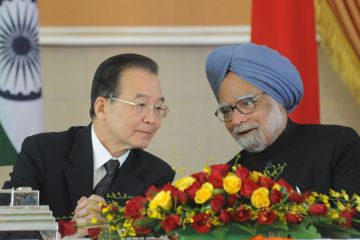PHNOM PENH, Nov 18:
Trade and investment are expected to be major issues to figure in the meeting between Prime Minister Manmohan Singh and his Chinese counterpart Wen Jiabao here tomorrow against the backdrop of India’s concerns over growing imbalance in trade and lack of market access to Indian investments in certain sectors in China.
During the meeting on the sidelines of the ASEAN Summit here, Singh is expected to seek larger investments from China, particularly in the National Manufacturing and Investment Zones being set up in India, according to indications given by Commerce Minister Anand Sharma today.
“The meeting between the Prime Ministers will cover all issues,” Sharma told journalists onboard the Prime Minister’s special flight while arriving for the ASEAN and East Asia Summits. The meeting between Singh and Wen, who have met a number of times during the last few years, could be their last as China has replaced its old guard with a new set of leaders.
Sharma said that in the past, India has flagged, both at meetings at Prime Minister level and Commerce Minister level, the issue of a “fair trade balance” and market access for India in IT and pharmaceutical sectors.
“But it doesn’t mean these are the only issues. We consider China as an important partner, largest trading partner,” Sharma added.
China is India’s largest trade partner but the trade deficit between the two economies has ballooned to USD 23 billion in China’s favour in October this year, as India continues to import more than what it exports to the country.
India and China have a set a target of taking their total trade to USD 100 billion by 2015. The total bilateral trade reached a high of USD 73.90 billion last year but the figure dropped to USD 55.6 billion in the first 10 months of this year, a drop of 8 per cent.
Sharma said cooperation between the two countries, including in investments and infrastructure sector, is increasing.
In this context, he referred to setting up of National Manufacturing and Investment Zones, 10 of which have already been notified, to raise the share of manufacturing from 16 per cent to 26 per cent within this decade and to create 100 million jobs.
These will be self-governing townships or zones and will require larger investment, technology transfer. “I am sure this will figure (in meeting between Singh and Wen),” he said in the context of India seeking larger funds.
He mentioned that Japan is already proactively engaged in a big way in infrastructure sector in India, particularly the ambitious project Delhi-Mumbai Industrial Corridor (DMIC), “which has now moved to implementation stage”.
To a question on change of leadership in China and whether he foresaw its impact on relations with India, the Commerce and Industry Minister said he expected continuity in the stability in the bilateral ties.
He refused to pre-judge whether the new Chinese leader Xi Jiaping was a conservative.
On the dispute over South China Sea and the Code of Conduct being developed by ASEAN countries over its use, Sharma said it was an issue concerning the respective nations who are expected to deal with it in a sovereign manner.
At the same time, he said India has always wished and supported any initiative which brings greater stability in this region.
He said India was keen on enhancing its engagement with ASEAN, a grouping of South East Asian countries, as it would “unleash” the trapped potential, particularly for North East.
This is why, a conference of ASEAN Economic Ministers is being held in Guwahati next month.
The trade between India and 10-nation ASEAN has been growing rapidly, despite strong recession in other parts of the world. Sharma said it was just USD 32 billion before Free Trade Agreement in Goods was signed three years back and now stands over USD 75 billion.
Border trade is also being opened with various countries. “We have done with Bangladesh, Myanmar… We are looking at other openings,” Sharma said.
Thailand, Myanmar and India have decided to work together in building connectivity. (PTI)
Trending Now
E-Paper


